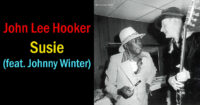The essence of the blues can not be written as a score, it must come spontaneously from within.
John Lee Hooker – Susie (feat. Johnny Winter)
John Lee Hooker : The Legend of Blues and “Mr. Lucky” John Lee Hooker, a towering figure in the world of blues, left an indelible mark on the music industry with his distinctive style, ...
Johnny Winter – Mississippi Blues
The essence of the blues can not be written as a score, it must come spontaneously from within.
Johnny Winter – Black Jack
Johnny Winter He was one of the most important blues and rock-blues guitarists in blues history. His playing has had a profound effect on generations of guitarists. He was born on February 23, 1944, ...
Johnny Winter – Stranger Blues
Johnny Winter was recognized for his contributions to the blues and rock genres and was inducted into the Blues Hall of Fame in 1988.
Johnny Winter – Suzie Q
In this night Johnny Winter, established his name in Europe. He gave one of the most important concerts in the total 17 Rockpalast Nights.
Johnny Winter – Stone County
Johnny Winter was known for his electrifying live performances. His high-energy shows were a testament to his skills as a performer.
Johnny Winter – Mojo Boogie
Johnny Winter: The Slide Guitar Maestro Johnny Winter wasn’t just a guitarist; he was a force of nature. With his long white hair and fiery guitar licks, he stood out. He made the guitar ...
Muddy Waters, Johnny Winter – Going Down Slow
Explore the iconic collaboration between Muddy Waters & Johnny Winter, and its impact on the blues genre’s timeless evolution.
Johnny Winter – Serious As A Heart Attack
Johnny Winter is widely regarded as one of the most influential and accomplished blues and rock musicians of the 20th century.









